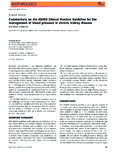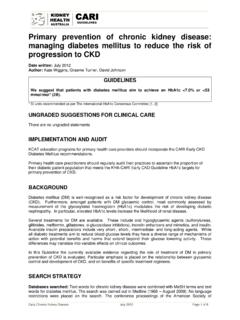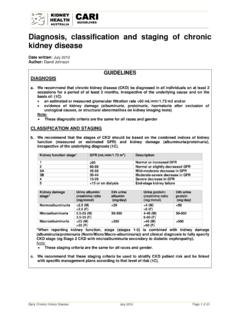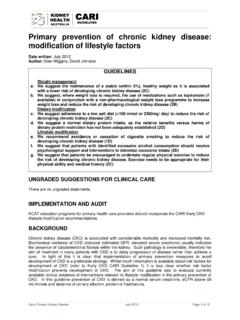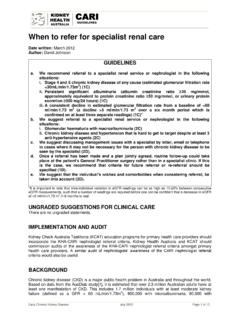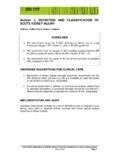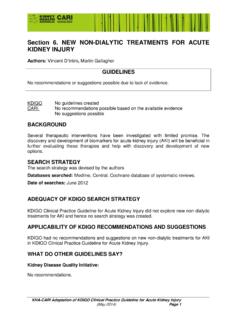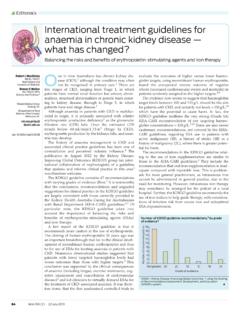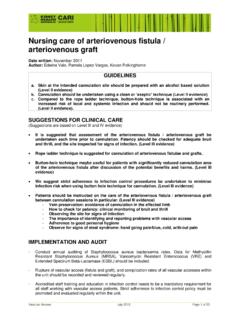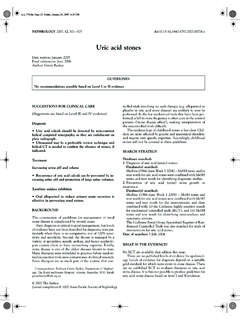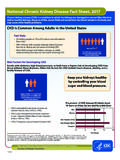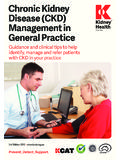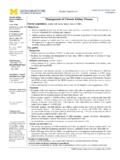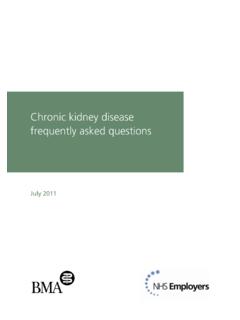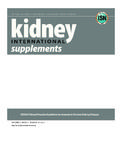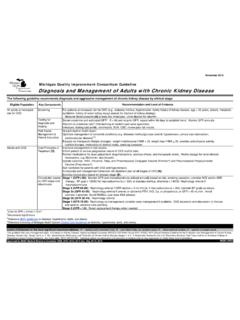Transcription of Modification of lifestyle and nutrition interventions …
1 _____ Early chronic kidney disease July 2012 Page 1 of 50 Modification of lifestyle and nutrition interventions for management of early chronic kidney disease Date written: July 2012 Author: Maria Chan, David Johnson GUIDELINES Dietary Modification Protein a. We suggest that patients with progressive chronic kidney disease (CKD) have individualised diet intervention involving an appropriately qualified dietitian (2C). b. We recommend adults with early CKD consume a normal protein diet, consisting of - g/kg/day, with adequate energy. This is in line with the Recommended Daily Intake (RDI) for the general population (1C). c. A low protein diet ( g/kg/day) to slow down CKD progression is not recommended due to the risk of malnutrition (1C). d. We suggest people with excess protein intakes reduce their intakes to the RDI levels as a high protein diet may accelerate renal function decline in mild renal insufficiency (2C). Salt e. We recommend that early CKD patients restrict their dietary sodium intake to 100 mmol/day (or g sodium or 6 g salt per day) or less, as it reduces blood pressure and albuminuria in patients with CKD (1C).
2 F. We recommend that patients with CKD should not use salt substitutes that contain high amounts of potassium salts (1D). Phosphate g. We suggest that early CKD patients (stages 1-3) should not restrict dietary phosphate intake, as restriction of dietary phosphate does not influence renal or cardiovascular outcomes in these patients (2C). Potassium h. We suggest that early CKD patients with persistent hyperkalaemia restrict their dietary potassium intake with the assistance of an appropriately qualified dietitian (2D). Polyphenol-enriched diets i. We suggest that in early CKD patients with diabetic nephropathy, consumption of a carbohydrate-restricted, low-iron-available, polyphenol-enriched (CR-LIPE) diet may slow the progression of diabetic nephropathy (2C). Caloric restriction j. We recommend that overweight/obese patients with CKD should be prescribed caloric restriction under the management of an appropriately qualified dietitian.
3 A reduction in weight can mean improvement of CKD (1C). k. We suggest that, in the absence of specific recommendations for CKD, overweight or obese patients are encouraged to lose body fatness to aim for a Body Mass Index (BMI) closer to kg/m2 and waist circumference 102 cm for men and 88 cm for women (2C). This is in line with the Dietary Guidelines for Australian Adults recommended by the NHMRC and Australian better health initiatives. Fruit and vegetables l. We suggest adults with early CKD consume a balanced diet rich in fruits and vegetables, as these appear to reduce blood pressure and have renoprotective effects comparable to sodium bicarbonate (2C). Mediterranean diet _____ Early chronic kidney disease July 2012 Page 2 of 50 m. We suggest adults with early CKD consume a Mediterranean style diet to reduce dyslipidemia and to protect against lipid peroxidation and inflammation (2C). Dietary Fibre n.
4 We suggest adults with early CKD consume a diet rich in dietary fiber that is associated with reduced inflammation and mortality in patients with CKD (2D). lifestyle Modification Physical exercise o. We suggest that patients with CKD be encouraged to undertake regular physical exercise that is appropriate for their physical ability and medical history (2B). p. We suggest that, in the absence of specific exercise recommendations, patients are encouraged to include a minimum of 30 minutes of moderate physical activity each day in line with the Guidelines for Australian Adults recommended by the NHMRC (2C). Smoking q. We recommend that patients with CKD stop smoking to reduce their risk of CKD progression and cardiovascular risk (1C). Alcohol r. There is no specific evidence for alcohol consumption in patients with CKD. However, we suggest the recommendations made by the NHMRC Australian Guidelines to Reduce Health Risks from Drinking Alcohol be applied to patients with early CKD (2C).
5 Carbonated beverages s. We suggest patients with CKD minimise their intake of cola beverages to a maximum of one glass (250ml) or less of cola per day (2C). Fluid intake t. We suggest that patients drink fluid in moderation. For most patients with early CKD, a daily fluid intake of L (including the fluid content of foods) is sufficient; this might need to be varied according to individual circumstances (2C). Note: There is no convincing evidence to date that pushing oral fluid intake beyond this amount, except in states of excessive fluid loss ( sweating or diarrhoea), is beneficial for long-term kidney health. UNGRADED SUGGESTIONS FOR CLINICAL CARE There are no ungraded statements. IMPLEMENTATION AND AUDIT KCAT education programs for primary health care providers should incorporate the CARI Early CKD lifestyle Modification and Nutritional Intervention recommendations. KHA and KCAT should commission audits of the awareness of each of the CARI Early CKD lifestyle Modification and Nutritional Intervention recommendations amongst primary health care providers.
6 BACKGROUND Important risk factors for chronic kidney disease (CKD) include diabetes mellitus, hypertension, obesity and smoking (reviewed in Early CKD Guideline 2). Modification of lifestyle habits ( healthy diet, physical exercise, smoking cessation, moderate alcohol consumption and weight loss in obese people) may therefore be of value in retarding the progression of CKD. In addition, restriction of dietary protein [1] and augmentation of fluid intake [2] have been recommended as a treatment for retarding CKD progression for over 50 years. The objective of the current guideline is to evaluate the available clinical evidence pertaining to the effects of dietary interventions , smoking cessation, increased fluid intake, moderated alcohol consumption and physical exercise on the progression of CKD. The group also considered the recommendations in other guidelines and the evidence underpinning these recommendations.
7 _____ Early chronic kidney disease July 2012 Page 3 of 50 The NH MRC Dietary Guidelines for Australian Adults are based on the best available scientific evidence to provide information for health professionals and the general population about healthy food choices, both quality and quantity ( ) (All levels of evidence). These guidelines encourage optimal eating to prevent under- or over- nutrition , inclusion of health promoting food components ( phytochemicals and antioxidants), dietary patterns and healthy lifestyles that will minimize the risk of developing diet-related diseases s uc h as coronary heart disease , vascular disease , obesity, diabetes, stroke, hypertension and cancer. Although these guidelines are not directly targeted to people with CKD, the recommendations are likely to help prevent or reduce risks and complications associated with CKD. The guidelines Enjoy a wide variety of nutritious foods and Prevent weight gain: be physically active and eat according to your energy needs and the sub-guidelines are known to be beneficial in the management of cardiovascular disease , hypertension and metabolic syndromes (all levels of evidence).
8 Examples of the sub-guidelines are Limit saturated fat and moderate total fat intake , choose foods low in salt and Limit your alcohol intake if you choose to drink . While these guidelines may provide useful generalised information for patients with CKD, referral to an appropriately qualified dietitian for patients with progressive CKD for individualised diet prescription is recommended. SEARCH STRATEGY Databases searched: Text words for chronic kidney disease were combined with MeSH terms and text words for low protein diet, dietary protein restriction, protein intake, dietary intake, low calorie diet, caloric restriction, dietary intervention, exercise, physical activity, alcohol, fluid intake, potassium, hyperkalaemia, water intake, weight loss and weight reduction. The search was carried out in Medline (1966 3 August 2009). No language restrictions were placed on the search. The conference proceedings of the American Society of Nephrology from 1994-2008 were also searched for trials.
9 An updated search was conducted in Medline (2010 May 2012). Text words and MeSH terms used were the same as those from the previous search. Date of search/es: 25 August 2010; May 2012 WHAT IS THE EVIDENCE? 1. Dietary protein restriction The effect of dietary protein restriction on CKD progression has been discussed in detail in the CARI Guidelines on Prevention of Renal Failure Progression ( ) and will be only briefly discussed here. The relationship between dietary protein restriction and non-diabetic renal failure progression has been examined by 5 meta-analyses [3-7], 14 randomised controlled trials (RCTs) [8-21], 1 prospective double-blind cross-over study [22], 9 prospective non-randomised controlled trials [23-31] and 16 prospective non-controlled trials [32-48]. The largest and best-designed prospective, randomised controlled trial to date was the Modification of Diet in Renal disease (MDRD) study [8]. Patients were included in the study if their GFR was 25-55 mL/ m2 (Study A) or 13-24 mL/ m2 (Study B), their mean arterial pressure was less than 125 mmHg and their dietary protein intake was greater than or equal to g/kg body weight/day (Study A only).
10 Patients with body weight extremes (<80% or >160% of standard body weight), "dubious" compliance, insulin-dependent diabetes mellitus or heavy proteinuria (>10 g/day) were excluded. Study A patients (n = 585) were randomly assigned (with adequate allocation concealment) to a usual protein diet ( g protein/kg/day) or a low-protein diet ( g/kg/day), while Study B patients (n = 255) were randomised to a low protein diet ( g/kg/day) or a very low protein diet ( g/kg/day). An open-label design was used. The groups were similar at the start of the trial. Only 3% of the patients had non-insulin-dependent diabetes mellitus and 24% of the patients had polycystic kidney disease . ACE inhibitors were permitted and used by 32-44% of patients in each of the randomisation groups. Mean follow-up was years (range 0 to ) and the drop-out rate was very low (Study A _____ Early chronic kidney disease July 2012 Page 4 of 50 , Study B ).
